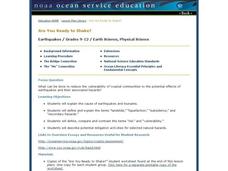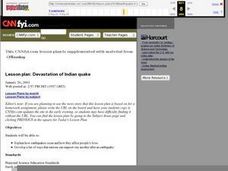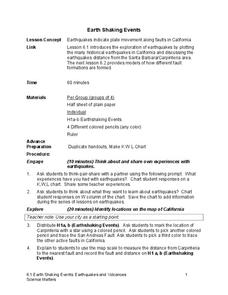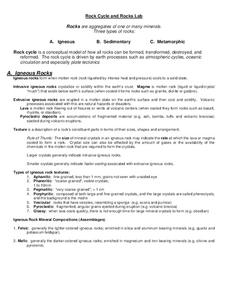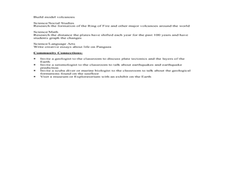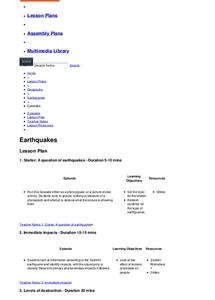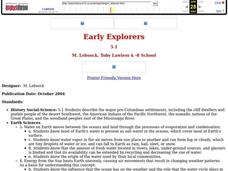Curated OER
Continents on the Move
Students examine the tectonic plates of the Earth and how the landforms of Earth have changed position over time. In groups, they identify the evidence that the continents are still moving. To end the lesson, they practice measuring...
Curated OER
Are You Ready to Shake
Learners examine earthquakes and tsunamis. In this Earth science lesson plan, students investigate the causes and hazards associated with earthquakes and tsunamis.
Curated OER
Strange Bugs
As individuals or in small groups, marine biologists research and discuss archaea and their unusual behavior as compared to bacteria. Teach them about the chemical makeup of the cell membrane of these strange organisms. This complex...
Curated OER
Devastation of Indian Quake
Learners read an online article at CNNfyi.com to determine what happened in India after an earthquake. They determine the magnitude of this earthquake and address the issue of relief efforts from other countries.
Science Matters
Fault Formations
The San Andreas Fault moves about two inches a year, approximately the same rate fingernails grow—crazy! The third lesson in the series allows for hands-on exploration of various fault formations. Through the use of a Popsicle stick,...
Science Matters
Earthquakes and Volcanoes Post Assessment
The final lesson in the 20-part series is a post assessment covering earthquakes and volcanoes. Twenty-three questions incorporate each of the previous lessons through multiple choice, justified multiple choice, expanded multiple choice,...
American Museum of Natural History
What Do You Know About Earth?
Time to rock and roll! Young scientists test their knowledge about rocks found on Earth and what they tell scientists. A 10-question quiz focuses on the different types of rocks, how they are formed, and what they are made of.
Science Matters
Earth Shaking Events
The world's largest measured earthquake happened in 1960 in Chile, reaching a terrifying 9.5 magnitude on the Richter Scale. The second lesson in the 20-part series introduces earthquakes and fault lines. Scholars map where previous...
Consortium for Ocean Leadership
Nannofossils Reveal Seafloor Spreading Truth
Spread the word about seafloor spreading! Junior geologists prove Albert Wegener right in an activity that combines data analysis and deep ocean exploration. Learners analyze and graph fossil sample data taken from sites along the...
University of New Orleans
Rock Cycle and Rocks Lab
Science rocks! Explore three types of rocks and the rock cycle with an igneous rocks experiment. Pupils discuss textures, composition, and learn how melts are formed from the Earth's crust. They weigh materials using a scientific scale...
Curated OER
Life of an Island: From Mountain to Atoll
Students research the evolution of a volcanic island from origin to erosion. They determine the relative ages of the Northwestern Hawaiian Islands given their position in the archipelago.
Curated OER
Name That Volcano
Students research volcanoes. In this volcanoes lesson, students visit websites with worksheets about the terms for volcanoes and volcanic eruptions in the world. Students complete the work online and play a game for volcano names.
Curated OER
Pangea All Lands
Students demonstrate how the earth's land masses were once one huge land mass known as Pangea. They fit continents together forming one large land mass. Describe the processes that cause plate movement.
Curated OER
Station: Earth's Interior
In this earth science worksheet, students cut out each die pattern and the signs for each station. Then they assemble the dice by folding along lines and taping the edges together. Students also follow the written instructions for...
Curated OER
Sea Floor Spreading Demonstration
Students examine the Earth's boundaries, the ocean floor, and the types of plate boundaries. In this sea floor lesson students fill out worksheets on the ocean floor and observe a demonstration.
Curated OER
Under My Feet
Fifth graders investigate the layers of the Earth, origin of tectonic plates and what happens when plates collide. They watch a video and use clay to demonstrate the different types of plate movement.
Curated OER
Earthquakes
Students take a closer look at earthquakes. In this earthquake lesson, students investigate the causes of Kashmir earthquake and the impact of the earthquake. Students also consider aid efforts in the aftermath of earthquakes.
Curated OER
Are We Falling Apart? Exploding Volcanoes
Students research and demonstrate volcanic activity. In this volcanism instructional activity, students research the types of volcanoes and define related terms using the Internet. They demonstrate volcanic activity with water, corn...
Curated OER
Early Explorers
Fifth graders study early explorers. For this World history lesson, 5th graders draw an outline of a map labeling each part, build geographical features out of dough, and paint each of the land and water features.
Curated OER
Solid Earth Socratic Questions
Students participate in a whole class discussion to relate what they know about earthquakes to the processes of plate tectonics. They respond to prompts that lead them to conclusions about the layers of the earth.
Curated OER
Earthquakes: Third Grade Lesson Plans and Activities
Introduce third graders to energy waves with a hands-on geology activity, in which they answer questions and compare seismograms in the San Francisco Bay area. After a demonstration that shows how bigger waves indicate a high-intensity...
NOAA
Subduction Zones
Sink into an interactive learning experience about subduction zones! Junior oceanographers examine the earth-shaking and earth-making effects of subduction in the fourth installment in a 13-part series. Hands-on activities include...
Discovery Education
STEM Camp—Urban Infrastructure
Build a bridge to learning in a STEM-aligned unit about urban infrastructure. Young engineers explore the many aspects of civil planning and design in a five-day unit. Content includes the challenging aspects of balancing building with...
Centers for Ocean Sciences
Ocean and Great Lakes Literacy: Principle 7
Your mission, should you choose to accept it, is to take your class on an underwater adventure. The final installment in a seven-part series involving salt and freshwater bodies takes junior oceanographers below the surface in...



